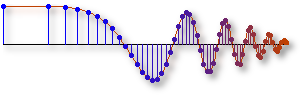Fourer Series Demo
shows how any periodic signal can be approximated as a sum of sinusoids.
It allows you to choose from several input signals and creates an approximation
to the signal you choose.
You can select how many cosine terms to use in the approximation.
The figures below can be easily reproduced; however the period of the
signal in the book is 40ms. We'll use 20s.
Do This:
Figure 3-17, p54
- Select Signal Type as Square.
- Set the Signal Period to 20.
- Set the Number of Fourier Coefficients to 3.
- The Waveform of the Signal should look like Figure 3-17.
How does it differ?
- The Magnitude Spectrum should look like Figure 3-16.
How does it differ? Are the differences between the demo and
the figures consistant?
- Adjust the number of coefficients to 7 and 17. Does it look
like the second and third plots in Figure 3-17?
Figure 3-19, p56
- Select Triangle and number of coefficients of 3.
- Does the waveform look like Figure 3-19? The match is
rather good using only k=3. Why does the squarewave require
so many more coefficients to fit?
Figure 3-20, p57
- Return to the settings for Figure 3-17. Set k=7.
- Check Show Error.
- Does the error look like Figure 3-20? What are the
differences? Why are there differences?
 Home
Home
 Home
Home